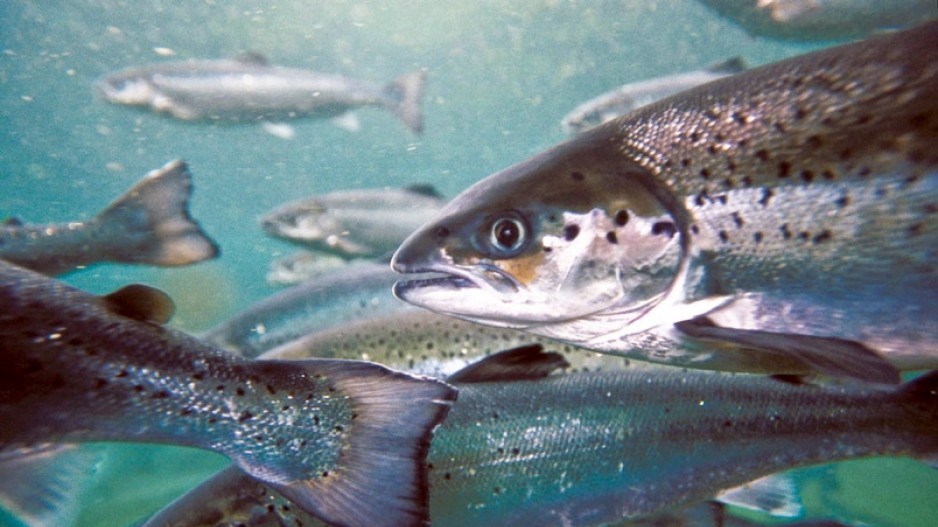As layoffs begin at Vancouver Island fish farms, B.C. salmon farmers are calling on the federal government to reconsider ordering 19 farms off the Discovery Islands to be shut down by summer 2022.
The B.C. Salmon Farmers Association is calling on the government to set aside its decision and instead embark on a new in-depth consultation with everyone involved in the sector.
It seeks a process “consistent with genuine reconciliation with First Nations and real engagement with all parties. The ball is now in the government’s court, and we ask them to seriously, and urgently, consider this reasonable way forward,” John Paul Fraser, executive director of the association, said Monday.
Beginning this week, fish farm company Mowi Canada West will be culling young salmon because it is now banned from placing them in marine net pens in that area and there’s no room in their operations elsewhere.
Fisheries Minister Bernadette Jordan announced Dec. 17 that effective immediately no new fish could go into Discovery Island farms.
All 19 farms must be closed by June 30, 2022. The farms, off the east coast of Vancouver Island, are run by Mowi, Cermaq Canada and Greig Seafood.
The goal is to protect wild salmon migrating through that area. Fish farm opponents have for decades raised alarms about open-net pens, fearing they will spread diseases and parasites to wild salmon.
Jordan consulted with First Nations in the area prior to her announcement.
Fish farm opponents cheered Jordan’s decision. Critics have urged industry to move over to other technology, such as closed pens.
B.C. wild salmon are facing challenges such as climate change, a warm-water offshore blob and a landslide which impeded returns on the Fraser River. Last year’s Fraser River sockeye run was the lowest in history.
Jordan’s decision means Discovery Islands farms are allowed to only raise fish already in pens. Once those fish are harvested, the pen shuts down and workers are not needed.
More than 10.7 million young salmon and eggs may be destroyed because of the lost capacity in the Discovery Islands, said economics consultant Rias Inc. in a report commissioned by the association.
Closing Discovery Island farms has the potential to put up to 1,500 jobs at risk, Rias said.
This includes at least 690 direct salmon farming jobs, working at broodstock farms, hatcheries, smelt farms, ocean farms and at primary processing facilities, the report said.
The Rias report said that 222 families have a member working on one of the Discovery Island farms, leading to an average loss of $79,000-plus in salary and benefits.
A salmon farm worker in many Indigenous and non-Indigenous households is the primary wage earner, it said.
Most salmon-farming jobs are full-time permanent positions with benefits. Starting salaries are typically more than $19 per hour.
Mowi handed out its first three layoff notices last week to employees who are based in the Campbell River area,
“It is going to be brutal,” Dean Dobrinsky, director of human relations and communications for Mowi.
“Our employees are going through a stretch of disbelief and fear,” Dobrinsky said.
“Now they’ve had their life ripped out from them.
“I honestly get heartbreaking phone calls from people on an almost daily basis,” he said. They ask how they will pay their mortgage, if they should be looking for another job and how will they manage in the future.”
Related operations may be curtailed outside of the immediate Discovery Islands area.
For example, Mowi’s 72-employee Surrey plant which packages salmon into portions will likely see cuts, Dobrinsky said.
A new smoked-salmon facility being built in Klemtu, off B.C.’s north coast, is expected to be impacted, he said.
Rias said closing Discovery Islands farms will result in B.C. businesses which provide goods and services losing more than $155 million in annual business.
As well, another 200 jobs may be lost at local businesses which rely on spending by salmon farmers, such as grocery stores and automotive dealerships, the report said.
Rias estimated that more than $390 million in annual economic output (which represents the value of goods and services produced) will be lost in B.C.
Different levels of government will lose $21 million in annual taxes and First Nations partnering with the companies will lose lease revenue, Rias said.
The industry had been prepared to invest more than $1.4 billion in new technology and equipment but now those plans are uncertain given Jordan’s decision, the study said.




